Pre-employment screening helps recruiters find top talent and understand what skills candidates will bring to their company. It's a key step in building strong teams.
This guide compares Adaface and CodeSignal, two popular assessment platforms. We'll look at their features so you can choose the best tool for your hiring needs.
Explore this post with:
Table of contents
How does Adaface work?
Adaface is an advanced online assessment platform designed to help recruiters screen candidates through skill-based tests. With a range of customizable assessments, Adaface aims to streamline the hiring process by ensuring only qualified candidates move forward.
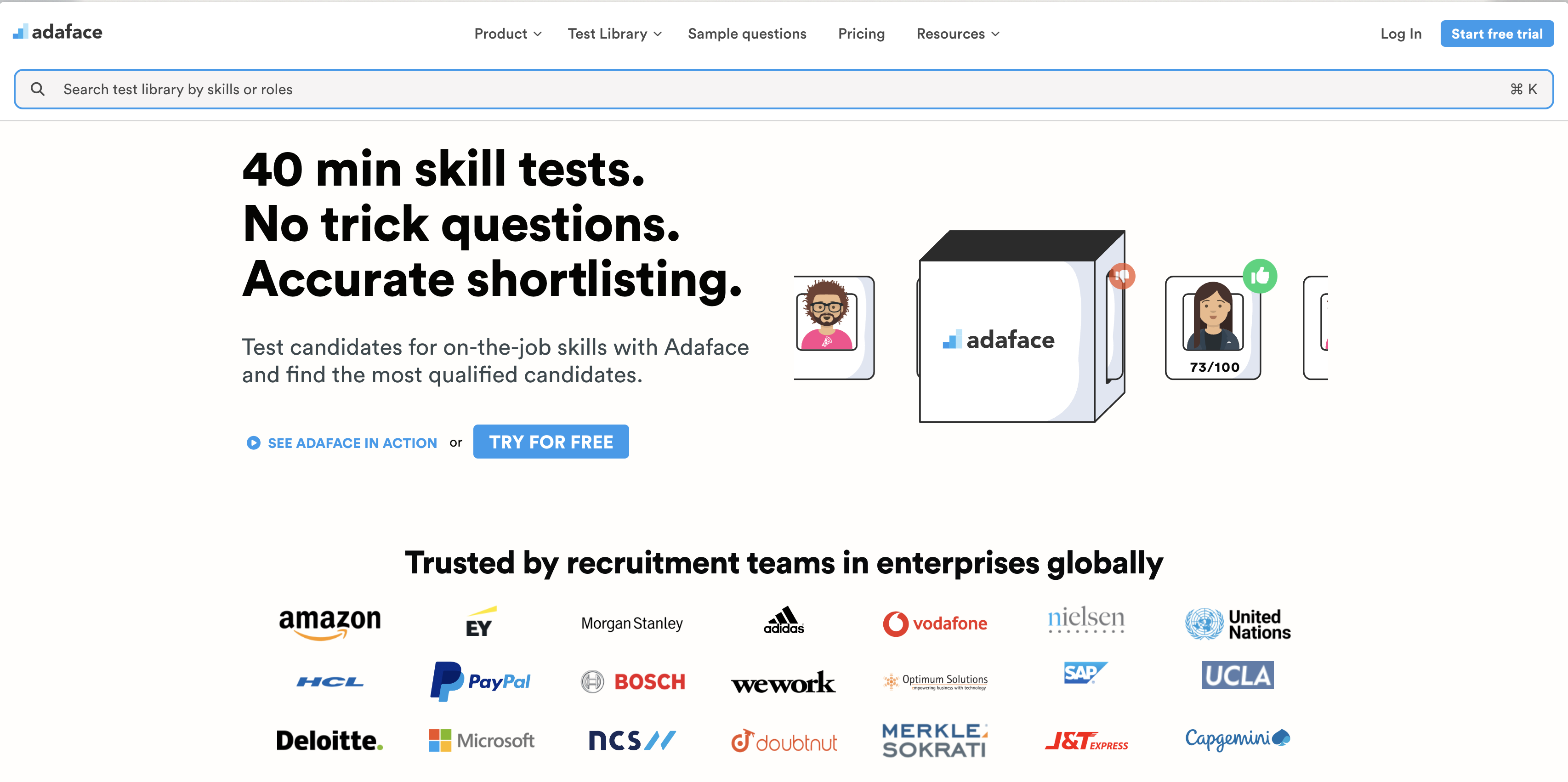
Recruiters use Adaface to create tailored assessments that match job descriptions, helping them find the best candidates without the hassle of manual screening. This approach ensures recruiters save time and focus on top-tier talent.
In addition to custom assessments, Adaface offers a library of ready-to-use tests across various domains like programming, business, and language skills. This versatility makes it a go-to for companies looking to evaluate specific skill sets quickly.
One standout feature of Adaface is its conversational interface, which makes the assessment experience engaging and candidate-friendly. Additionally, Adaface supports mobile access, ensuring candidates can complete assessments on the go.
How does CodeSignal work?
CodeSignal is an assessment platform that aims to help companies hire top tech talent by offering a range of coding challenges and tests. It focuses primarily on evaluating candidates' programming skills through a series of standardized tests.
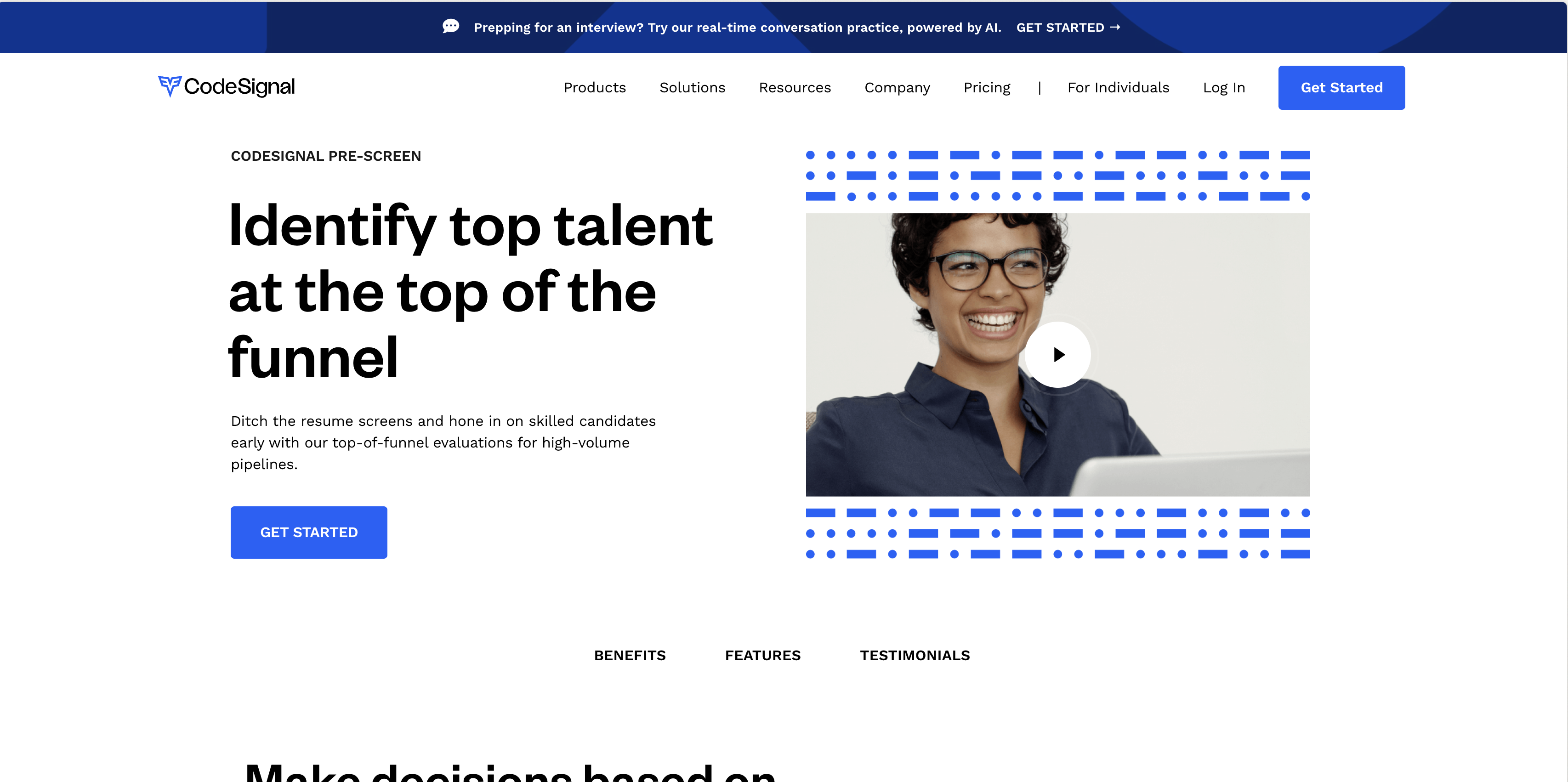
Users can create tests based on pre-made templates which assess various tech skills like data structures, algorithms, and specific programming languages. You can then invite candidates via email to take the test in a controlled, proctored environment.
One notable feature is CodeSignal’s code playback, which lets recruiters review a candidate’s coding process in detail. Automated scoring also ensures that candidates' results are evaluated promptly, allowing recruiters to make faster decisions.
However, CodeSignal does not offer situational judgment tests, aptitude tests, or job-specific assessments. This may leave gaps in evaluating non-technical skills important for a well-rounded hire.
Adaface vs CodeSignal: Test libraries
Adaface and CodeSignal both offer extensive libraries of test questions to evaluate diverse skills such as programming, cognitive ability, and more. While Adaface caters to a broader range of skills and roles, CodeSignal focuses primarily on programming assessments.
Leveraging these test libraries before interviews enables recruiters to filter out candidates who lack the required skills, ensuring more fruitful interview sessions. By doing so, companies can save time and resources, leading to better hiring outcomes.
Adaface's test library
Adaface's test library stands out with its wide array of assessments designed to evaluate various skills. It includes tests for programming, situational judgment, aptitude, business acumen, typing, personality, and languages, making it one of the most versatile libraries in the market.
Recruiters gravitate towards Adaface’s test library because it offers tailored evaluations based on precise job descriptions. For every opening, the platform helps create custom tests that match the specific skills required, ensuring a perfect fit for the role.
Putting Adaface to work is simple. Start by exploring the Pre-Employment Assessment Test Library For 500+ Skills, then select or customize tests to meet your hiring needs. With options for programming tests, AI tests, and role-specific tests, you’re sure to find the right match for every position.
CodeSignal's test library
CodeSignal's test library boasts a variety of programming tests designed to assess coding skills across multiple languages. While it offers scenario-based coding challenges, it falls short in providing a well-rounded assessment library that includes situational judgment and aptitude tests.
One of the key selling points of CodeSignal's library is its focus on real-world coding scenarios, which can help employers gauge candidates' problem-solving abilities in practical situations. This makes it a popular choice for companies looking to evaluate technical proficiency effectively.
However, CodeSignal's library lacks depth when it comes to personality assessments, typing tests, and business-related evaluations. Companies seeking a broader range of skills may find themselves wanting more options to customize tests tailored to specific job roles.
Comparison of test libraries
Adaface vs CodeSignal: Business, Marketing and Ops Roles
Hiring the right candidate is like finding a needle in a haystack; it’s tough! That's why recruiters use tests to see if a candidate's skills match the job requirements, ensuring they can hit the ground running.
Adaface and CodeSignal both offer assessments to gauge on-the-job skills, but their approaches vary. Adaface boasts a rich library of 500+ custom tests that cover everything from programming to business skills, while CodeSignal focuses more on coding assessments with limited role-specific options.
Business, Marketing and Ops Roles with Adaface
Adaface excels in functional testing for on-the-job skills by providing:
- A library of 500+ tests across diverse categories
- Customizable tests tailored to job descriptions
- Scenario-based questions to better evaluate real-world skills
Recruiters choose Adaface because it allows them to assess real-world skills effectively, ensuring candidates are not just book-smart but also ready for the actual work environment.
Additionally, Adaface’s platform supports adding custom questions and provides detailed analytics, making it easier for recruiters to track candidate performance and make informed hiring decisions.
Hiring Business, Marketing and Ops Roles with CodeSignal
CodeSignal is primarily known for its developer assessments, but when it comes to non-developer roles, the offerings are somewhat limited. Unlike its comprehensive support for technical skills, CodeSignal doesn't extend its testing capabilities to roles outside of the tech sphere. Therefore, businesses looking to assess candidates in areas such as finance, marketing, or administrative positions might find their options a bit constrained.
Despite the narrow focus, CodeSignal's test library does include ready-to-use tests, providing companies with a straightforward solution for immediate deployment. This can be helpful for tech-driven companies that occasionally need to fill non-developer roles with candidates possessing a basic level of aptitude. However, if you're seeking a test library that spans a wider variety of skill areas, this might not fully meet your needs.
One noticeable gap in CodeSignal's offering is the lack of customization options for non-developer role assessments. Companies looking to tailor tests to specific job descriptions or create custom questions might find this limiting. Additionally, the absence of situational judgment and business-specific tests can pose challenges for businesses aiming to evaluate candidates for nuanced, role-specific skills in non-tech areas.
Adaface vs CodeSignal: Developer hiring
Recruiters use pre-employment tests to screen developers because it provides insights into their coding skills and problem-solving abilities. These tests help in identifying candidates who can meet the technical requirements of a job role efficiently.
Adaface and CodeSignal both offer a range of functionalities designed to hire developers, including coding challenges and algorithmic-thinking assessments. However, the depth and breadth of these functionalities can differ significantly between the two platforms.
Hiring developers with Adaface
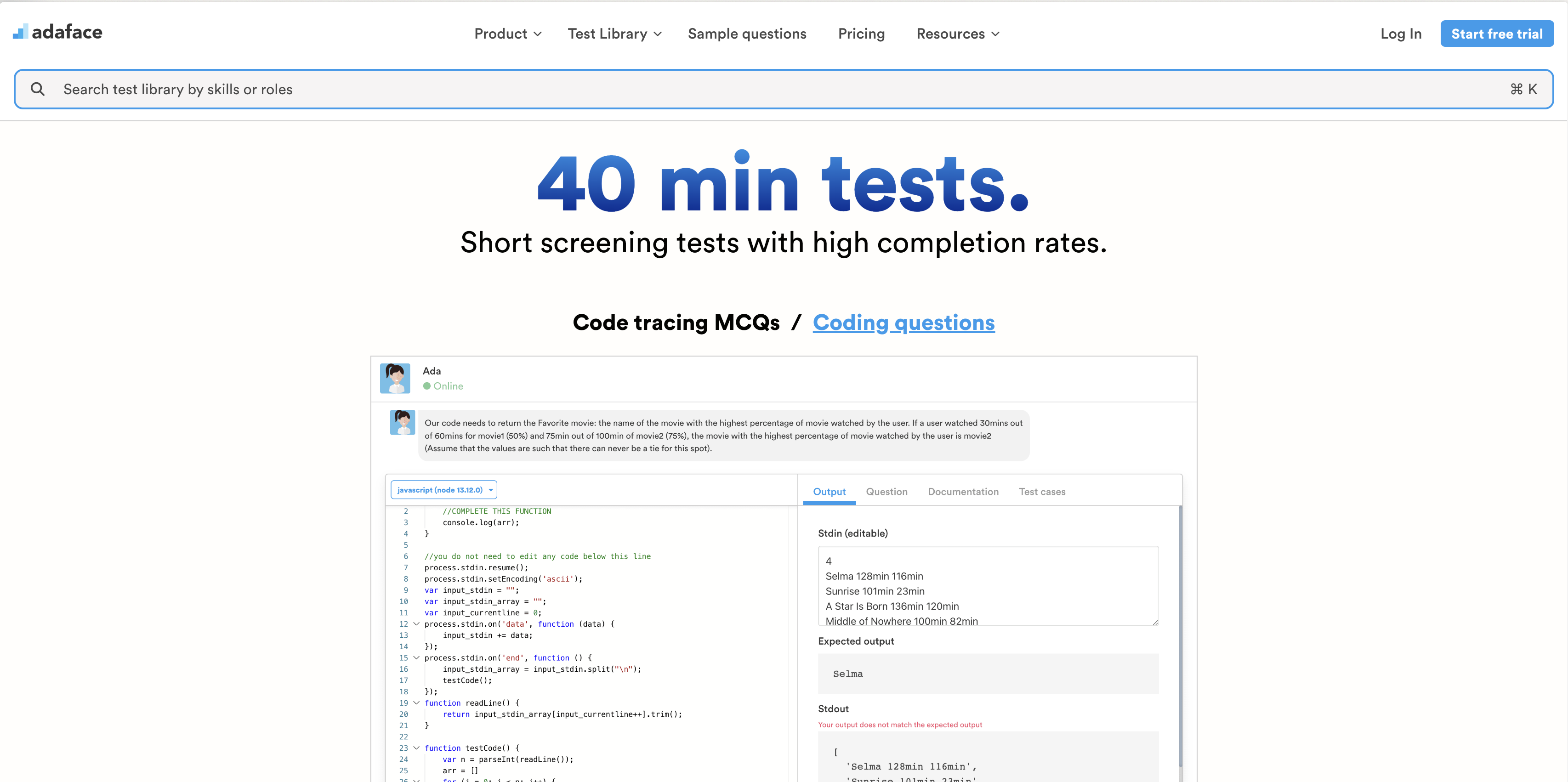
Adaface offers various functionalities that stand out for developer hiring:
- Programming language coding questions and MCQs
- Web and mobile framework questions
- Data Structures and Algorithm questions
- SQL coding and Excel workbook questions
- Code playback and automated scoring
- Custom coding questions
Recruiters use Adaface to hire developers because it provides a balanced mix of coding challenges and MCQs across various programming skills. This helps in evaluating both theoretical knowledge and hands-on coding ability, making the screening process more robust.
Additionally, Adaface allows recruiters to create custom coding questions tailored to their specific needs. Features like code playback and automated scoring enhance the evaluation process, ensuring accurate and quick assessments.
Hiring developers with CodeSignal
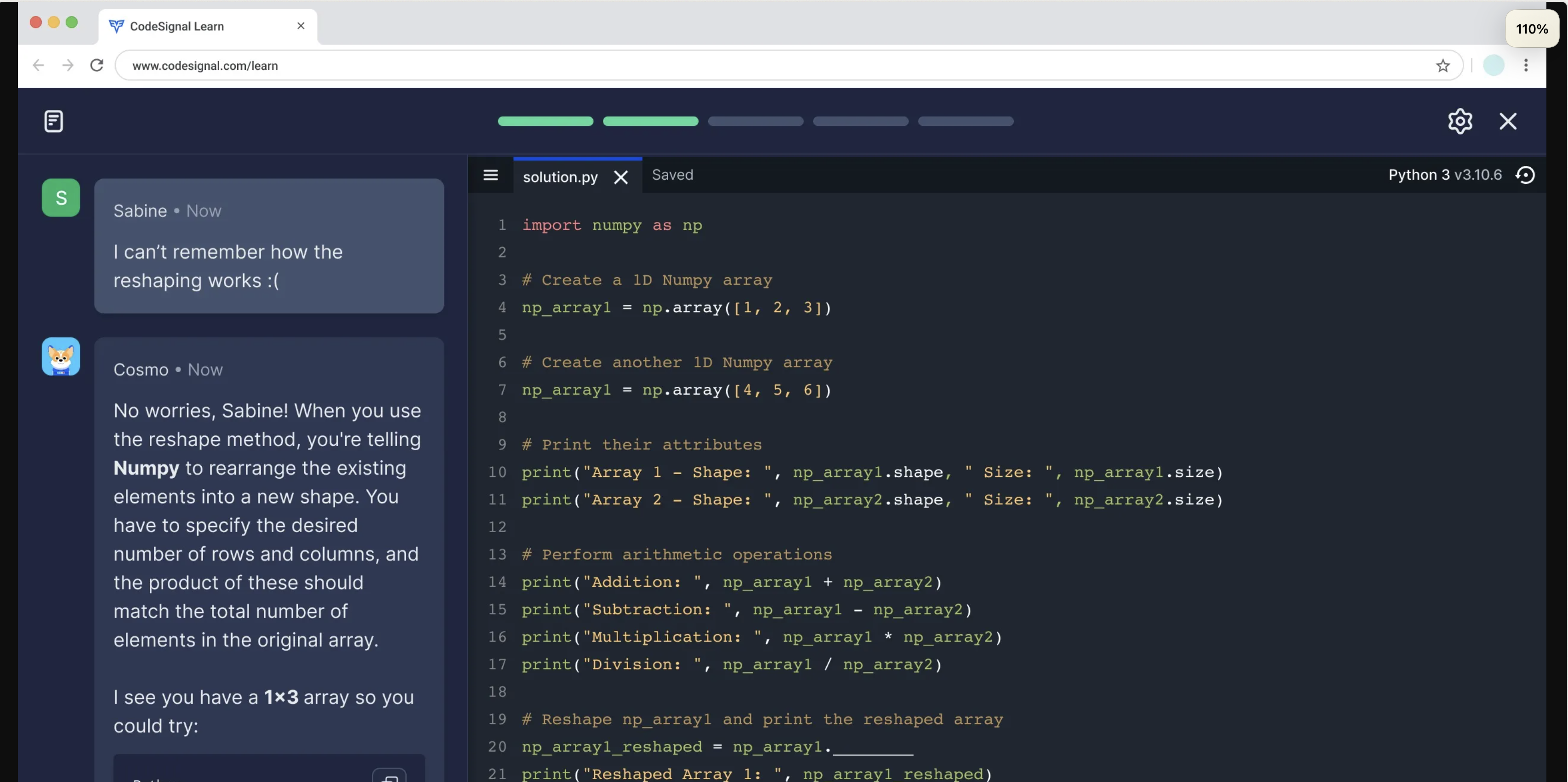
CodeSignal supports a variety of programming assessments, offering coding questions in multiple languages as well as data structure and algorithm challenges. However, it falls short in providing specific tests for web and mobile frameworks, which are increasingly important in today's tech landscape.
With its extensive library, CodeSignal allows hiring managers to mix and match coding tasks to create tailored assessments. This enables recruiters to evaluate candidates on relevant skills, although they miss out on more interactive and project-oriented questions that better simulate real-world scenarios.
Interestingly, CodeSignal lacks certain features that could enhance the candidate evaluation process, such as code playback for reviewing coding sessions or a more diverse selection of question types. This gap might leave hiring managers wanting more in terms of thorough candidate assessments.
Comparison of developer hiring features
Adaface vs CodeSignal: Candidate experience and company branding
Candidate experience can make or break your hiring process. A positive experience ensures higher completion rates and fosters a good relationship with potential hires. On the flip side, if candidates feel the process is too cumbersome or outdated, they’re likely to drop out.
Several features play a role in shaping this experience. The length of the test, mobile compatibility, and available support can significantly impact a candidate’s perception. Companies should focus on these elements to create an engaging and seamless process for their applicants.
Candidate experience and company branding with Adaface
Adaface shines in offering a conversational interface that feels more like a friendly chat than a rigorous test. This approach significantly enhances the candidate experience by reducing anxiety and making the assessment a more engaging process. It's a pleasant break from traditional, more rigid formats.
Mobile-friendly assessments are another highlight of Adaface’s offering. Candidates can complete tests on any device, be it a phone, tablet, or desktop. This flexibility is especially beneficial for candidates on the go, allowing them to take assessments at their convenience.
Shorter, focused assessments are a game-changer with Adaface, typically lasting around 40 minutes. This duration is long enough to gauge skills accurately but short enough to keep candidates engaged and willing to complete the test. For more detailed insights on implementing effective assessments, check out our guide on setting up coding tests.
Candidate experience and company branding with CodeSignal
CodeSignal offers a straightforward candidate experience with its online assessments. Candidates receive email support and access to help documentation to resolve queries. However, the typical assessment length of 2 hours may be daunting for some candidates.
A noteworthy aspect of CodeSignal is its real-time coding events, which create an engaging, competitive environment. These events can be branded with the employer's logo and colors, enhancing the company's visibility. This gamified approach can make the assessment process more appealing to tech-savvy candidates.
On the flip side, CodeSignal lacks features like mobile-friendliness and qualifying questions at the start of the test. Without these, candidates might find the platform less accessible and may end up spending unnecessary time on assessments they aren't qualified for. A conversational interface could also make the experience more engaging and less formal for candidates.
Adaface vs CodeSignal: Anti-cheating features
Online assessments open the door to potential cheating, compromising the integrity of the hiring process. A robust anti-cheating system is crucial for ensuring fair and accurate evaluations.
Anti-cheating features of Adaface
Adaface's anti-cheating measures provide a multi-layered defense against cheating. Some key features include:
- User authentication: Candidates must verify their identity before starting the test.
- Webcam and browser monitoring: Adaface tracks video, tabs, and windows to ensure candidates stay focused.
- Location and IP tracking: Adaface logs location and IP data to detect potential cheating attempts.
- Device fingerprinting: Adaface identifies devices to prevent multiple candidates from using the same machine.
- Copy-paste protection and full-screen mode: These features prevent candidates from accessing external resources during the test.
Adaface's remote proctoring capabilities also include protection against AI assistants like ChatGPT. With a vast 20,000-question bank, Adaface can create unique tests, further minimizing the risk of cheating through leaked questions.
Anti-cheating features of CodeSignal
CodeSignal offers a range of anti-cheating features. These include user authentication, time limits on tests, web proctoring, webcam proctoring, and copy-paste protection. They also enable full-screen mode during assessments to minimize distractions and potential cheating attempts.
These features help companies ensure the integrity of their technical assessments. For example, webcam proctoring allows recruiters to verify that candidates are taking the test themselves, while time limits add pressure that makes it harder for test-takers to search for answers online.
However, CodeSignal's anti-cheating toolkit lacks some advanced features. It doesn't track candidate location or IP address, which could help identify suspicious test-taking patterns. There's also no mention of device fingerprinting or Chat GPT protection, which could provide additional layers of security against modern cheating methods.
Comparison of anti-cheating features
Adaface vs CodeSignal: Pricing and free trial
Pricing for pre-employment assessment tools often varies based on the volume of candidates and the features included. Recruiters should look for transparent pricing to make informed decisions.
Adaface pricing
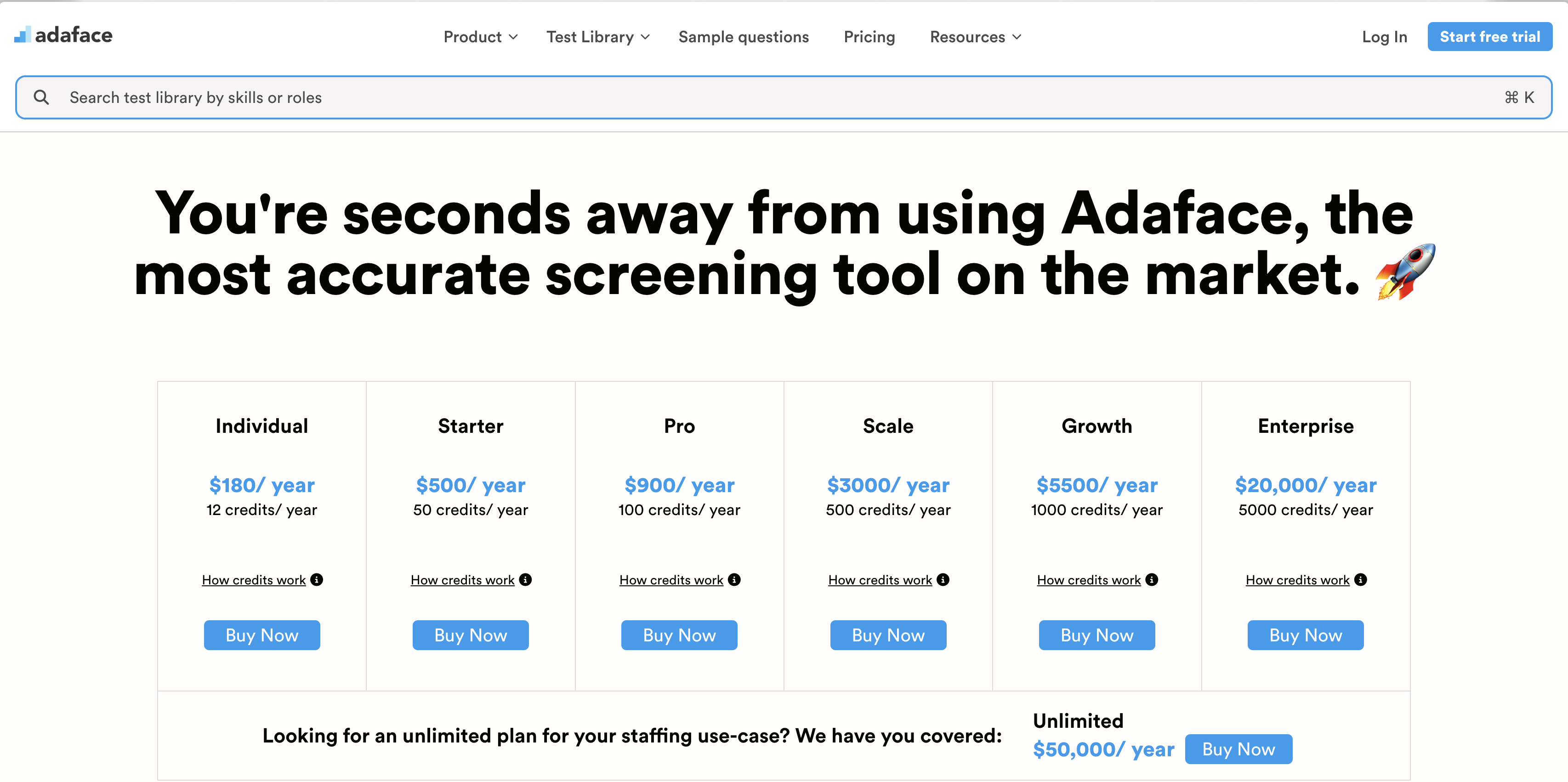
Adaface offers a range of pricing plans designed to suit different hiring needs. Our plans are clearly listed on our pricing page, making it easy for recruiters to find the best fit.
We provide several options: Individual Plan at $180, Starter Plan at $500 for 50 credits, Scale Plan at $3000 for 500 credits, Growth Plan at $5500 for 1000 credits, Enterprise Plan at $20000 for 4000 credits, and an Unlimited Plan at $50000 per year.
With Adaface, you can explore all features and even start with a free trial. This allows companies to experience the platform before committing, ensuring that the chosen plan aligns perfectly with their hiring goals.
CodeSignal pricing
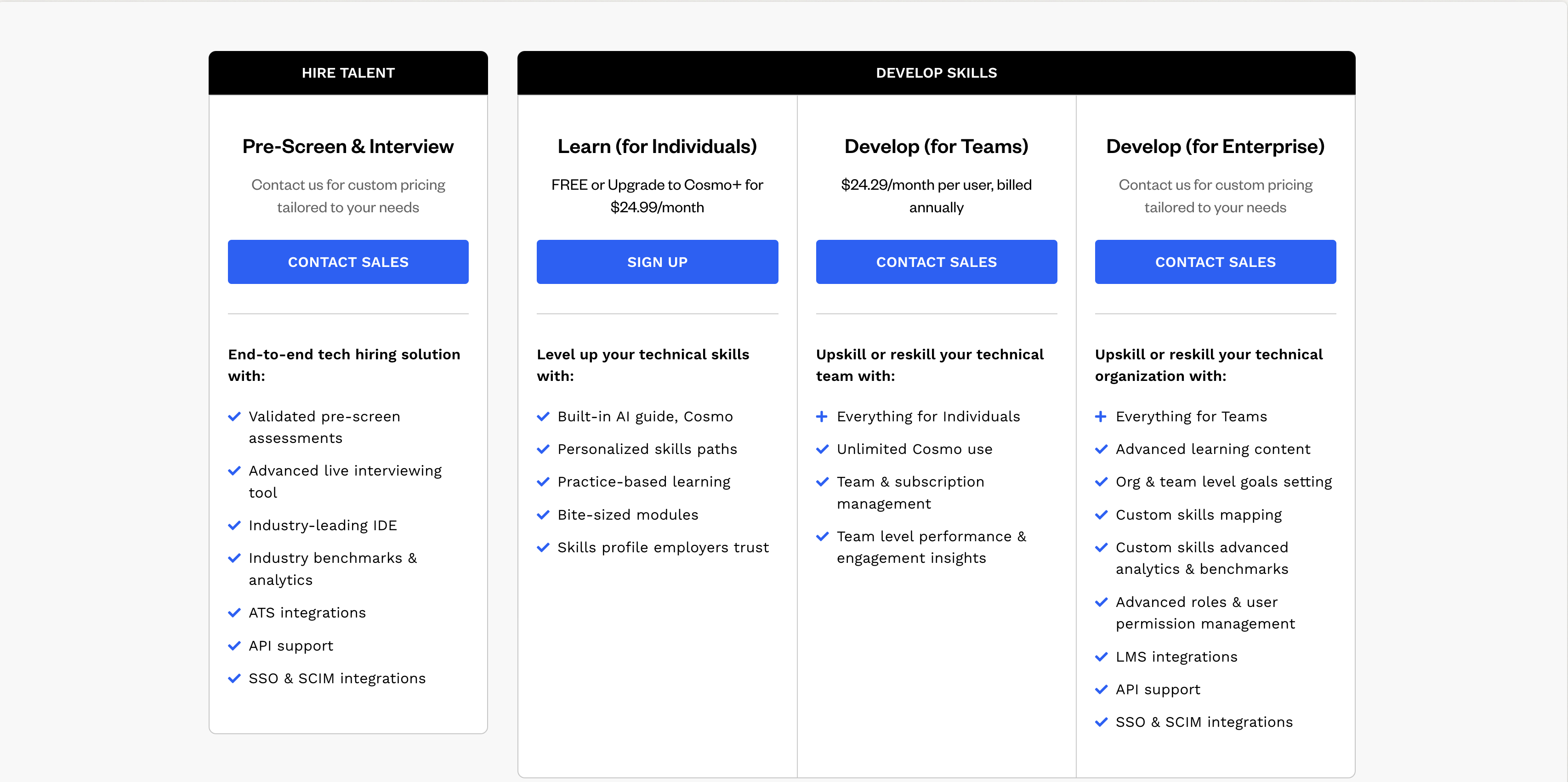
CodeSignal offers a tiered pricing structure that caters to different user needs, but it makes you play a little hide-and-seek to get the details. Here’s a quick look at what they offer:
- Individual Plan: Contact for pricing.
- Starter Plan: Custom pricing available.
- Scale Plan: Custom pricing available.
- Growth Plan: Custom pricing available.
- Enterprise Plan: Custom pricing available.
While their plans seem flexible, users have to reach out to their sales team for specific numbers, which can feel like trying to find a needle in a haystack.
One thing that might leave potential customers scratching their heads is the lack of a transparent pricing model and a straightforward sign-up process. You can’t just sign up and jump in to explore the features; instead, you’ll need to fill out a form and wait for a sales call. This could make it harder for recruiters to evaluate the platform and compare it to others quickly, potentially leading to missed opportunities.
Comparison of pricing
Adaface vs CodeSignal: Scorecards, reporting and analytics
Recruiters rely on scorecards, reporting, and analytics to make informed hiring decisions. An ideal product should offer detailed and easily shareable reports, benchmarking against industry standards, and insightful analytics to identify top candidates swiftly.
Adaface scorecards, reporting and analytics
Adaface provides a seamless experience with its scorecards, reporting, and analytics features. Detailed audit timelines, skill-wise analysis, and automated scorecard generation ensure that recruiters have all the information they need at their fingertips.
Adaface's scorecards break down candidate performance by skills, offering a radar chart that compares scores against industry norms and company averages. This helps recruiters quickly identify areas of strength and potential weaknesses in candidates.
For recruiters looking for sample scorecards, Adaface offers a variety of assessments such as the aptitude-test-graphic-designer-assessment and the data-structures-online-test scorecard. These samples provide a clear picture of how Adaface presents data in a user-friendly and insightful manner.
CodeSignal scorecards, reporting and analytics
CodeSignal offers a range of reporting and analytics features. These include public reports that can be shared via unique links, benchmarking to compare candidates, and a skills profile to quickly assess performance across multiple areas.
The platform generates automated scorecards and alerts, helping recruiters move faster with candidates who pass tests. CodeSignal also provides a comprehensive overview where recruiters can compare multiple candidates at once across different skill scores.
While CodeSignal covers many bases, it lacks some reporting options. The platform doesn't offer PDF, Excel, or CSV report formats, which could limit sharing and data analysis possibilities. Additionally, the skill-wise analysis is limited to IT skills, potentially leaving gaps in evaluation for other domains.
Comparison of scorecards, reporting and analytics
Adaface vs CodeSignal: Enterprise and startup friendliness
Whether you're a bustling startup or a giant enterprise, a friendly test provider should offer seamless integrations, customizability, and scalable features. These ensure that the platform grows with your needs and supports your unique workflows.
Adaface's enterprise and startup friendliness
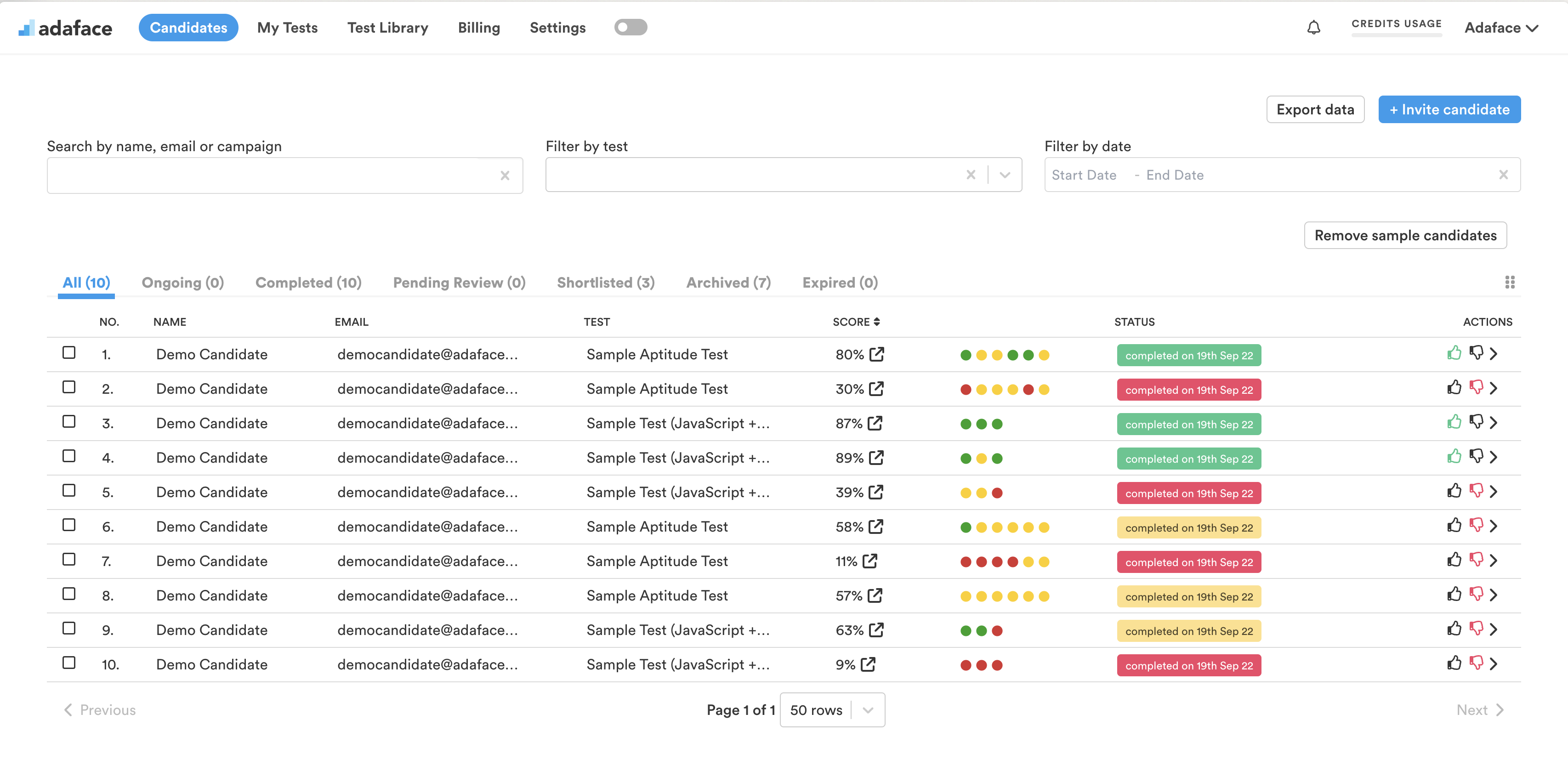
Adaface excels in meeting the requirements of enterprises. With GDPR compliance and support for custom data locations, it ensures that big companies adhere to data privacy laws and store data securely.
Adaface offers role-based access and unlimited team seats, which are great for both startups and large organizations. This means your team can collaborate effectively without worrying about extra costs or access restrictions.
For startups, Adaface shines by providing multiple invite options and bulk action capabilities. Whether you’re inviting candidates via email or public links, or managing candidates in bulk, Adaface makes the process effortless.
CodeSignal's enterprise and startup friendliness
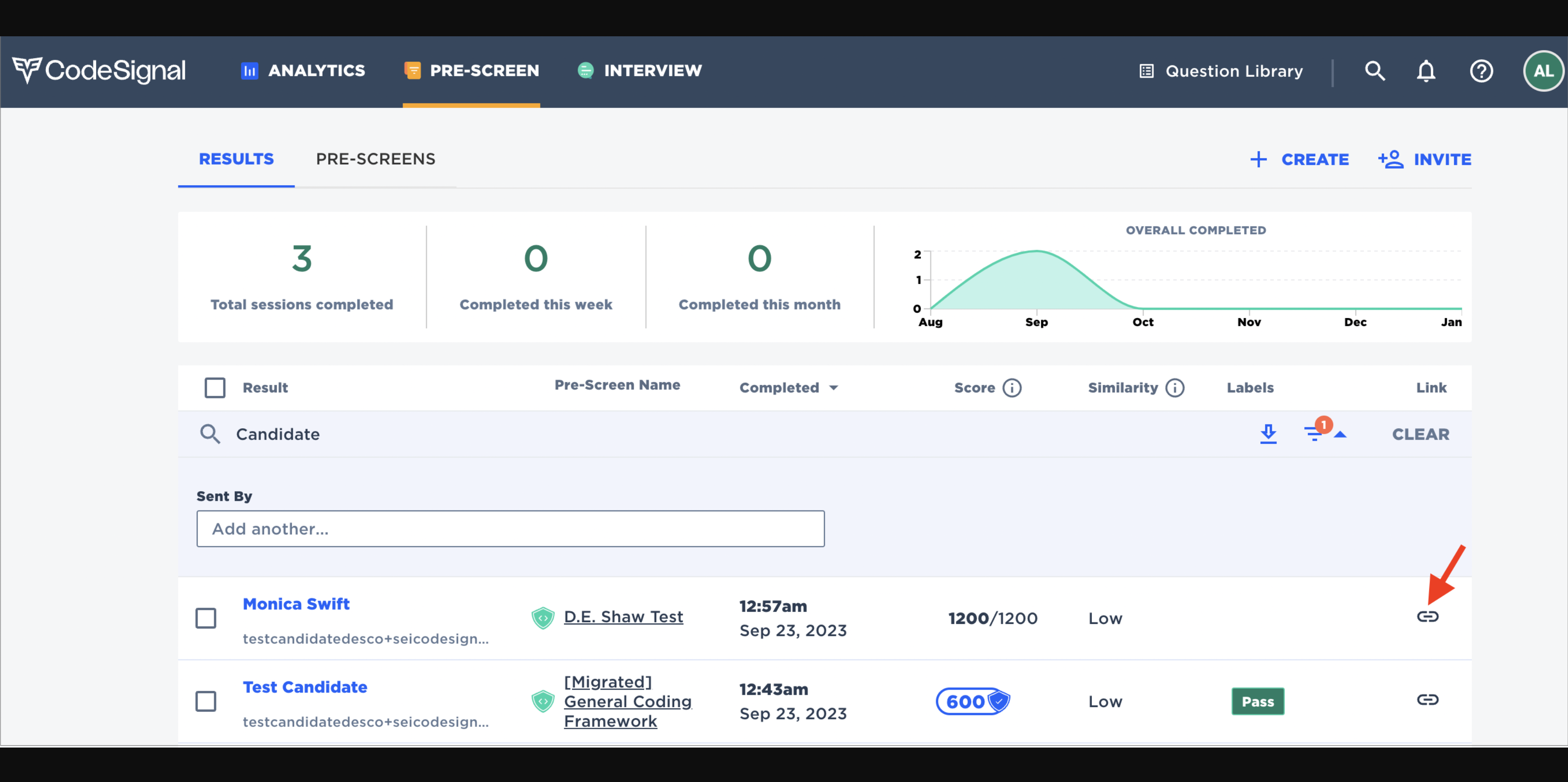
CodeSignal offers ATS integrations and GDPR compliance, catering to enterprise needs. However, it lacks custom API support and role-based access, which could limit flexibility for some organizations.
For startups and enterprises, CodeSignal provides assessment tools that can be used in hiring processes. This allows companies to evaluate candidates' coding skills before moving forward with interviews.
While CodeSignal covers basic enterprise requirements, it may not fully address the needs of companies looking for advanced features like custom data location support, multiple question sets, or AI-powered recruiter workflow optimization.
Comparison of enterprise and startup friendliness
Adaface vs CodeSignal: Final verdict
Both Adaface and CodeSignal offer coding tests and automated scoring to evaluate technical skills. They also provide benchmarking to compare candidates against each other.
However, Adaface stands out with its wider range of assessments. Beyond coding, it offers aptitude, business, language, and personality tests. This makes it useful for hiring across many roles and industries.
CodeSignal focuses mainly on programming tests, which can be limiting if you need to assess other skills. Its typical assessment length is also 2 hours, compared to Adaface's shorter 40-minute tests.
Streamline hiring with skill tests
Adaface provides more flexibility with custom questions, multiple question sets, and tests tailored to specific job descriptions. It also offers more anti-cheating features like IP and device fingerprint tracking.
Pre-employment assessments help you objectively evaluate candidates' skills, reduce bias, and save time in the hiring process. They give you a fuller picture of each applicant's abilities.
These tools streamline recruiting by quickly comparing candidates and identifying top performers. This lets you focus your efforts on the most promising applicants.
For most companies, Adaface is the better choice due to its versatility across different roles and industries. To learn more, check out our plans or sign up for a free trial to see how Adaface can improve your hiring process.
Adaface vs CodeSignal FAQs
Adaface offers a broader range of tests including aptitude, business, and language tests, while CodeSignal focuses mainly on programming tests.
Adaface tests typically last 40 minutes, while CodeSignal tests can take up to 2 hours.
Both platforms offer anti-cheating features, but Adaface provides more options like IP tracking and device fingerprinting.
Adaface offers transparent pricing on their website with various plans, while CodeSignal requires contacting their sales team for pricing information.

40 min skill tests.
No trick questions.
Accurate shortlisting.
We make it easy for you to find the best candidates in your pipeline with a 40 min skills test.
Try for freeRelated posts



